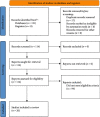Effectiveness of Smartphone-Based Physical Activity Interventions on Individuals' Health Outcomes: A Systematic Review
- PMID: 34409104
- PMCID: PMC8367594
- DOI: 10.1155/2021/6296896
Effectiveness of Smartphone-Based Physical Activity Interventions on Individuals' Health Outcomes: A Systematic Review
Abstract
Design: A systematic review. Data Sources. 114 studies were gathered using the following search descriptors: ("mobile phone" OR "smartphone" OR "cell phone" OR "mobile device" OR "mobile apps" OR "mHealth") AND ("exercise" OR "physical activity" OR "physical fitness" OR "motor activity") AND ("physiological outcomes" OR "weight outcomes" OR "psychological outcomes" OR "health" OR "health behavior"). Seven databases were used including databases such as Academic Search Premier and PubMed. PRISMA guidelines were followed in this review. Eligibility Criteria for Selecting Studies. The 20 articles included in this review met the following inclusion criteria: (1) randomized and controlled trials, (2) involving an outcome variable measured by accelerometer, and (3) intervention enforced by a smartphone application.
Results: Overall, 56% of the studies reviewed in this paper resulted in successful interventions. Of the 19 articles that examined the first individual health outcome of physical and physiological outcomes, 11 interventions resulted in a positive effect on one of the following parameters: MVPA/step count, sedentary behavior, cardiorespiratory fitness, and blood pressure. Six interventions examined the effects on the second individual health outcome, weight-related outcomes. Five of these interventions observed significant positive effects from mobile application interventions on weight and waist circumference. Six articles evaluated the effectiveness of smartphone-based physical activity interventions on the third and final individual health outcome, psychological outcomes, with four resulting in significant positive outcomes in self-efficacy, life enjoyment/satisfaction, and intrinsic PA motivation.
Conclusion: The findings in this review suggest that mobile application physical activity interventions, compared to unguided exercise activities, can effectively improve certain health outcomes for individuals such as physical/physiological and weight-related outcomes. It was found that research in the area of effectiveness of mobile application interventions on specific psychosocial health outcomes such as self-efficacy, life enjoyment, and intrinsic PA motivation is limited. Thus, the effect of mobile health applications remains unclear for psychosocial outcomes. Due to this limitation, more research is warranted to confirm the findings of this review.
Copyright © 2021 Mia A. Emberson et al.
Conflict of interest statement
The authors declare that there is no conflict of interest regarding the publication of this paper.
Figures
References
-
- Pope Z. C., Barr-Anderson D., Lewis B., Pereira M., Gao Z. Use of wearable technology and social media to improve physical activity and dietary behaviors among college students: a 12-week randomized pilot study. International Journal of Environmental Research and Public Health. 2019;16(19):p. 3579. doi: 10.3390/ijerph16193579. - DOI - PMC - PubMed
Publication types
MeSH terms
LinkOut - more resources
Full Text Sources
Miscellaneous


